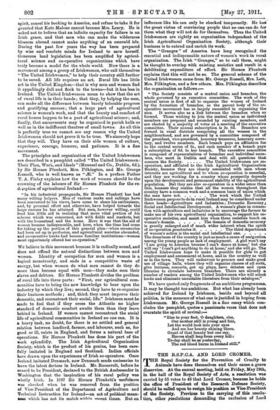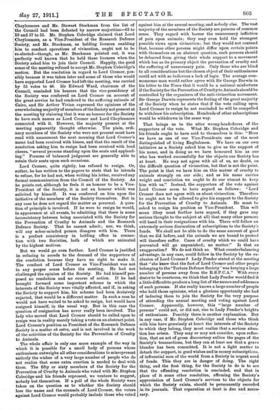THE R.S.P.C.A. AND LORD CROMER.
THE Royal Society for the Prevention of Cruelty to Animals have done themselves and their cause a grave disservice. At the annual meeting, held on Friday, May 19th, in the hall of the Royal Society of Arts, a resolution was carried by 55 votes to 48 that Lord Cromer, because he holds the office of President of the Research Defence Society, should be called upon to resign his position as Vice-President of the Society. Previous to the carrying of this resolu- tion, other resolutions demanding the exclusion of Lora Cheylesmore and Mr. Stewart Stockman from the list of the Council had been defeated by narrow majorities-63 to 59 and 57 to 55. Mr. Stephen Coleridge claimed that Lord Cheylesmore, as a Vice-President of the Research Defence Society, and Mr. Stockman, as holding licences enabling him to conduct operations of vivisection, ought not to be re-elected—though, as Mr. Stockman pointed out, it was perfectly well known that he held these licences when the Society asked him to join their Council. Happily, the good sense of the meeting refused to accept Mr. Stephen Coleridge's motion. But the resolution in regard to Lord Cromer, pos- sibly because it was taken later and some of those who would have supported Lord Cromer had left the meeting, was carried by 55 votes to 48. Sir Edward Ward, chairman of the Council, reminded his hearers that the vice-presidency of the Society was conferred on Lord Cromer on account of the great service he had rendered to the suffering animals of Cairo, and Sir Arthur Vivian expressed the opinions of the overwhelming majority of members of the Society not present at the meeting by claiming that it was an honour for the Society to have such names as Lord Cromer and Lord Cheylesmore connected with it. However, the majority present at the meeting apparently thought otherwise. The plain, ordi- nary members of the Society who were not present must have read with amazement the next morning that Lord Cromer's name had been received with hisses, and that the result of the resolution asking him to resign had been received with loud cheers, " several persons standing upon the seats and applaud- ing." Persons of balanced judgment are generally able to retain their seats upon such occasions.
Lord Cromer, quite rightly, has refused to resign. Or, rather, he has written to the papers to state that he intends to refuse, for he had not, when writing his letter, received any formal communication from the Council of the Society. As he points out, although he feels it an honour to be a Vice- President of the Society, it is not an honour which was solicited by himself. It was conferred on him upon the initiative of the members of the Society themselves. But in any case he does not regard the matter as personal. A ques- tion of principle is involved. If he were to resign he would, in appearance at all events, he admitting that there is some inconsistency between being associated with the Society for the Prevention of Cruelty to Animals and the Research Defence Society. That he cannot admit; nor, we think, will any sober-minded person disagree with him. There is a perfect consistency in holding office in connec- tion with two Societies, both of which are animated by the highest motives.
But we would go even further. Lord Cromer is justified in refusing to accede to the demand of the supporters of the resolution because they have no right to make it. The conduct of Lord Cromer as Vice-President was not in any proper sense before the meeting. He had not challenged the opinion of the Society. He had himself pro- posed no resolution and no course of action. If he had brought forward some important scheme in which the interests of the Society were vitally affected, and if, in asking the Society to support him, his scheme bad been decisively rejected, that would be a different matter. In such a case he would not have waited to be asked to resign, but would have resigned himself, in the usual way. But in this case the question of resignation has never really been involved. The lady who moved that Lord Cromer should be called upon to resign was in reality merely taking a vote on an abstract point. Lord Cromer's position as President of the Research Defence Society is a matter ab extra, and is not involved in the work of the activities of the Society for the Prevention of Cruelty to Animals.
The whole affair is only one more example of the way in which it is possible for a small body of persons whose enthusiasm outweighs all other considerations to misrepresent entirely the wishes of a very large number of people who do not realize that some extra exertion is needed to deal with them. The fifty or sixty members of the Society for the Prevention of Cruelty to Animals who voted with Mr. Stephen Coleridge and his friends represent, we venture to suggest, nobody but themselves. If a poll of the whole Society were taken on the question as to whether the Society should lose the name and the counsels of Lord Cromer, the voters against Lord Cromer would probably include those who voted against him at the annual meeting, and nobody else. The vast majority of the members of the Society are persons of common sense. They regard with horror the unnecessary infliction of pain upon animals ; they may even hold the strongest possible views upon vivisection ; but they would not contend that, because other persons might differ upon certain points with themselves on an abstract question, such persons should be debarred from giving their whole support to a movement which has as its primary object the prevention of cruelty and the suffering of unnecessary pain. Only those who are blind to all considerations but the chosen object of their enthusiasms could act with so ludicrous a lack of logic. The average com- monsense man would rather agree with Sir George Darwin in his letter to the Times that it would be a national misfortune if the Society for the Prevention of Cruelty to Animals should be controlled by the organizers of the anti-vivisection movement. Sir George Darwin represents the feeling of the great majority of the Society when he states that if the vote calling upon Lord Cromer to resign be not rescinded he will be compelled to withdraw his subscription. Hundreds of other subscriptions would be withdrawn in the same way.
That brings us to the utter wrong-headedness of the supporters of the vote. What Mr. Stephen Coleridge and his friends ought to have said to themselves is this "Here we have as one of our Vice-Presidents one of the most distinguished of living Englishmen. We have on our own initiative as a Society asked him to give us the support of his name, and in doing so we have honoured him as one who has worked successfully for the objects our Society has at heart. He may not agree with all of us, no doubt, on the difficult question of vivisection, but that is not the point. The point is that we have him on this matter of cruelty to animals strongly on our side ; and as his name carries weight and conviction we ought to do our utmost to keep him with us." Instead, the supporters of the vote against Lord Cromer seem to have argued as follows : "Lord Cromer does not agree with us about vivisection. Therefore he ought not to be allowed to give his support to the Society for the Prevention of Cruelty to Animals. He must be asked to resign his position as Vice-President. This will mean (they must further have argued, if they gave any serious thought to the subject at all) that many other persons will hand in their resignations with his. There will follow an extremely serious diminution of subscriptions to the Society's funds. We shall not be able to do the same amount of good that we did before, and the animals we are bound to protect will therefore suffer. Cases of cruelty which we could have prevented will go unpunished; no matter." Is that an exaggeration P We do not think so. What counterbalancing advantage, in any case, could follow in the Society by the ex- clusion of Lord Cromer P Lady Pender stated at the meeting that "she knew that the fact of Lord Cromer and other people belonging to the ' Torture Defence Society ' was keeping a large number of persons away from the R.S.P.C.A." With every desire to be courteous, we think that Lady Pender would find it a little difficult to produce a long list of the names and addresses of such persons. If she really knows a large number of people who hold those opinions, what a glorious opportunity she bad of inducing them to join the Society for the very purpose of attending the annual meeting and voting against Lord Cromer. Apparently, however, this "large number of persons" could not, or did not, rise to Lady Pender's heights of enthusiasm. Possibly there is another explanation. But in any case, if Mr. Stephen Coleridge and those who think with him have genuinely at heart the interests of the Society to which they belong, they must realize that a serious situa- tion has arisen. They may or may not consider, upon reflec- tion, that an act of gross discourtesy sullies the pages of the Society's transactions, but they can at least see that a grave blunder has been committed. It is not a light mathr to detach the support, in good wishes and in money subscriptions, of influential men of the world from a Society in urgent need of funds. This they are in danger of doing. The right thing, and the first thing, for the Society to do is to see that the offending resolution is rescinded, and that in place of it some other resolution, affirming the Society's appreciation of Lord Cromer's services to the objects for which the Society exists, should be permanently recorded in its journals. That reparation at least is due and neces- sary.











































 Previous page
Previous page